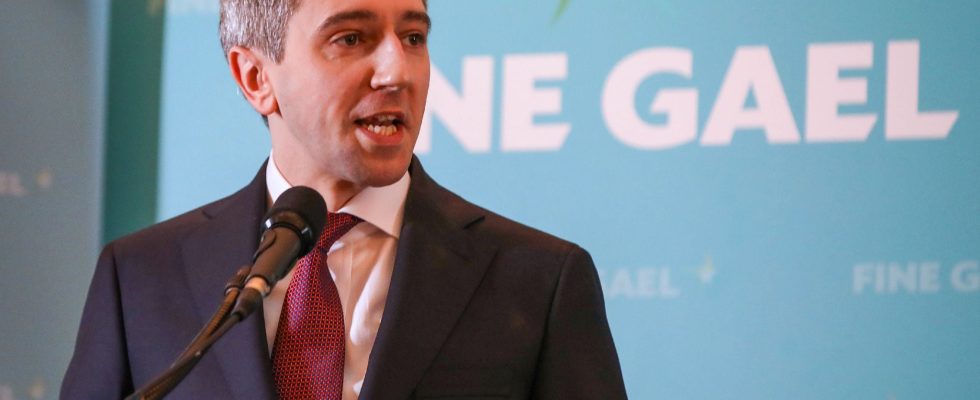The youngest Prime Minister in the history of his country, recognized for his communication skills including by his opponents, but who comes to power in a very delicate political context for his party. Any resemblance to the French political situation would be purely coincidental: this is indeed Simon Harris, 37, who was officially appointed this Tuesday, April 9 as the new head of government of the Republic of Ireland. Enough to make him the youngest leader at the European Union summit table.
A member of the center-right Fine Gael party, he will lead the coalition government at the head of the country since 2020 with the other center-right party, Fianna Fall. He replaces Leo Varadkar, who resigned in March to everyone’s surprise in a country experiencing a major housing crisis, but also by increasingly intense discussions on possible reunification with Northern Ireland.
Parliament’s “baby”
Born in 1986, Simon Harris grew up in a small town near Dublin. He began by campaigning to improve the lot of autistic people, made aware of this subject by his brother suffering from Asperger’s syndrome. Entering the youth branch of the centrist Fine Gael party at the age of 16, he was elected to Parliament at the age of 24, in 2011, earning him the nickname “The Baby of the Dail” (the name of the Irish Parliament). He was then appointed Minister of Health in 2016, at just 29 years old, then Minister of Higher Education in 2020.
But it is rather another nickname which now seems to have taken precedence: the “TikTok Taoiseach” (the Irish name for the Prime Minister). Simon Harris thus became known for his mastery of new communication tools, particularly during the start of the Covid-19 crisis, when he was Minister of Health at the time. In the first months of the crisis, he organized live broadcasts on the social network Instagram, in a much more educational, empathetic and informal tone than the sometimes often negative, even catastrophic briefings from the head of the Irish health service. “When he started doing his lives on Instagram, it was really amateur. I thought it was a waste of time,” a government source told the Irish newspaper. The Irish Times. Until one evening when I came home, and I saw my roommates listening to him on Instagram and hanging on his every word. I then realized the impact he had.”
“A new energy”
Accused by some of doing a little too much to try to attract young voters, Simon Harris has already announced that he does not want to change his style. During his speech after the MPs’ vote, he promised to “bring new ideas, new energy” and “new empathy to public life”.
During his speech to Parliament, Simon Harris notably promised to tackle the serious housing crisis hitting the country. But also to go to Brussels this week to confirm Dublin’s position on the war between Israel and Hamas, while Ireland is historically one of the most pro-Palestinian countries in the EU. “Innocent children, women and men are being starved and massacred,” he insisted. “We did not remain silent about the unforgivable terrorist acts of Hamas on October 7 and we cannot remain silent about the disproportionate reaction of the Israeli government.”
A difficult succession
Simon Harris will have the difficult task of succeeding Leo Varadkar, whose resignation last March surprised the whole country. The latter, a mixed-race and gay doctor, himself the youngest Irish Prime Minister at the time of his appointment, has given a facelift to the image of his country, long considered very conservative under the influence of the Catholic Church. He also distinguished himself by a policy of intransigence during Brexit, refusing the return of a physical border between Ireland and Northern Ireland, which could have reignited fire on the island since the Friday agreements. Saint from 1998.
But Leo Varadkar’s popularity had clearly eroded in recent times. In particular, a referendum last March, which proposed to modify the references to women and the family in the Constitution. The two amendments were largely rejected, more than 67% for the one broadening the concept of family beyond the notion of marriage, and more than 73% for the one erasing from the text the priority role of mothers in ensuring the “duties servants” in a household. A vote which crystallized discontent in the country of five million inhabitants, the government being accused of having poorly prepared the ground.
Pressure in the polls
Enough to further drastically reduce the popularity of his party: Fine Gael is today left behind in the polls by its coalition partner, Fianna Fall. But above all he is more than 10 points behind the left nationalists of Sinn Fein, the former political branch of the IRA (the Irish Republican Army), and the main party in favor of unification in Ireland.
Sinn Fein… already in power in Northern Ireland for the first time in its history, since February. The Northern Irish Prime Minister has already announced the color, predicting that a reunification referendum would be held on the island within the decade. But the subject could perhaps even return earlier, with the next parliamentary elections in the Republic of Ireland due to be held by March 2025.
